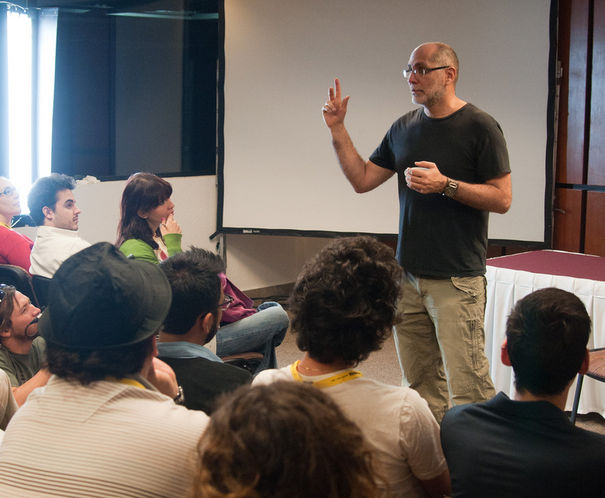Redemptions of Cinematographic Literature
Rubén Padrón Astorga of the Talent Press Guadalajara reports from a three-hour workshop of screenwriting legend Guillermo Arriaga at the 2011 Talent Campus Guadalajara.

Screenwriter Guillermo Arriaga at the 2011 Talent Campus Gudalajara
His low and hostile voice, his vicious and penetrating stare, his calculated and suspicious movements, made me think that Guillermo Arriaga did not feel comfortable with us when he began presenting his workshop on screenplays in this, the third, Talent Campus Guadalajara of the Guadalajara International Film Festival. But, it was a trick. Just as in his stories, in order to know who Guillermo Arriaga is, you must first question the mystery, or in other words: you must ask the essential question, “la pregunta dramatica” – as he likes to call it – the question Arriaga uses to discover the ultimate meaning of the reality of the story that he wants to tell. “Ask the dramatic question, do not leave it unanswered!”
Arriaga is a storyteller and – you discover this upon asking him questions – an enthusiastic fan of communicating what he knows. During the more than three hour workshop, he confessed his tricks, perhaps not his most intimate of tricks, but definitely the most efficient, the most useful that can be passed on to a stranger who wishes to dedicate himself to writing.
Guillermo Arriaga is one of the great authors of contemporary cinema. The complexity of his stories, the elaboration of his dramatic structures, the synthesis with which he manages to express his message, his ability to determine the exact weight of each gesture, the scope of each word, the depth of each silence, have allowed for films such as BABEL, 21 GRAMS, THE THREE BURIALS OF MELQUIADES ESTRADA, or AMORES PERROS to flow from his hands. These films are immediately stored in your memories and from their first screenings begin to change the future of cinema.
He relates his experiences as if he had just lived them, and when he wishes to show something, he speaks of himself with an assuredness that appears to be unbreakable and sometimes merely a humble request. At times he speaks like a great writer and at times like an amateur screenwriter that humbly shares his thoughts. “Never stop questioning what you do. Listen to what others have to say.”
He does not make arguments, he does not investigate, nor does he construct the past in his characters. He allows himself to be surprised by his stories, lets them determine their own paths, their evolution, and when they do not, he uses a trick. “Remove the dialogues, cut the scene in half, delete the last four paragraphs”.
One of the things that most bother Arriaga is the denial of autonomy of a literary text, and he does not understand why they are called “guiones” (script) and not “guías” (guides), because they are not given their independence as is done for texts in theatre, and why those that write them are not considered authors. He does not accept that a director should appropriate the story of a film, which in fact belongs to the screenwriter. “When you write, you tell the story of your life”, and he shared moments of his childhood that later became the beginnings of BABEL, the end of AMORES PERROS, key scenes of THE BURNING PLAIN, THE THREE BURIALS OF MELQUIADES ESTRADA and 21 GRAMS.
The other Guillermo Arriaga, the one who reveals himself after you have answered the “pregunta dramatica”, he looks you in the eyes with sympathy, speaks informally, asks you where you are from, and tells you that he has been there, too: he spoke in Portuguese with a Brazilian, remembered all the train stations in Caracas with a Venezuelan, and called me “asere” because that is how we Cubans address each other.
Arriaga never stops teaching. While he speaks, he continually adds helpful advice, and, while he writes at home, he sends tags on Twitter. “In art neither volition nor progress exist – since one cannot foretell the success of a work, nor whether it will be necessarily better than the others, and in fact generally the opposite occurs”; “You can use any dramatic recourses you wish, as long as you use them well”; “In literature, the author has to make the necessary decisions, not the probable ones”; “Never explain the story, and if you do, it is better if you just don’t tell it”; “You must knock on doors when you need support and convince companies that your project is wonderful, or no one will help you, or wait for help from the state; convince them that it is better to give you money than it is to build a school.”
He sent us to see TEMPORADA DE PATOS, to read Rulfo, and to adore Shakespeare; he spoke to us of his favorite screenwriters, of his family, of how hard it is to film in Hollywood, of what Tarantino once told him, of how likeable Charlize Theron is. We flooded him with questions, more than I heard in any other Talent Campus session. And for each one he had a friendly answer.


301 Moved Permanently